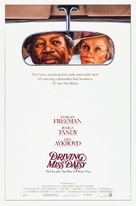Reviews provided by RottenTomatoes
Dave Kehr, Chicago Tribune: For Tandy, it's her most substantial film role since her sublime work in Alfred Hitchcock`s 1963 The Birds, and she takes full advantage of it; never playing for sympathy, she earns it completely. Read more
Gene Siskel, Chicago Tribune: One of the year's best films, a rarity in that a play has been successfully transferred to film without having the dialogue seem "written." Read more
Peter Rainer, Los Angeles Times: Freeman and Tandy have their own performer's pride, and that transfers to their characters. Tandy, in particular, is almost astringent in her denial of easy emotion. Read more
Jay Boyar, Orlando Sentinel: This is a story about people, not politics. And perhaps because we can see the actors in closeup on the screen, that is even truer of the movie than the play. Read more
Desmond Ryan, Philadelphia Inquirer: Driving Miss Daisy spans a quarter-century in the intricate relationship of a Southern dowager and her chauffeur, and it is a movie that invites you to appreciate the passage of time in more than one way. Read more
Jonathan Rosenbaum, Chicago Reader: The movie also has something legitimate and instructive to say about the subtlety and intricacy of everyday race relations in the south during the period covered (roughly 1948 to '73). Read more
Owen Gleiberman, Entertainment Weekly: Jessica Tandy and Morgan Freeman give exceptional performances Read more
Kathleen Carroll, New York Daily News: The movie never resorts to sentimentality. It has a dry wit as well as genuine warmth. Best of all it is the perfect showcase for two deserving actors -- Jessica Tandy and Morgan Freeman. Read more
Vincent Canby, New York Times: There is an exhilarating, singularly theatrical lightness of touch that is often lost when these settings are made manifest in a movie. Read more
Roger Ebert, Chicago Sun-Times: Driving Miss Daisy is a film of great love and patience, telling a story that takes 25 years to unfold, exploring its characters as few films take the time to do. Read more
Peter Travers, Rolling Stone: This is Tandy's finest two hours onscreen in a film career that goes back to 1932. Read more
Richard Schickel, TIME Magazine: Alfred Uhry's adaptation of his Pulitzer-prizewinning play aspires more to complex observation of human behavior than to simple moralism about it. Precisely because it has its priorities straight, it succeeds superbly on both levels. Read more
Colette Maude, Time Out: Far too cosy to serve as an effective social or political metaphor; better to regard it as a solid ensemble piece. Read more
Joseph McBride, Variety: Bruce Beresford's sensitive direction complements Alfred Uhry's skillful adapation of his Pulitzer Prize-winning play. Read more
Desson Thomson, Washington Post: The movie gets you mainly because Morgan Freeman, who played chauffeur Hoke Colburn in the original stage production (and won his third Obie for it), takes the wheel and drives Daisy all the way home. Read more
Rita Kempley, Washington Post: The story holds a potential for sap that is mostly unfulfilled thanks to Beresford's stately approach, the stars' better judgment and the protagonists' sharp wits. Read more

